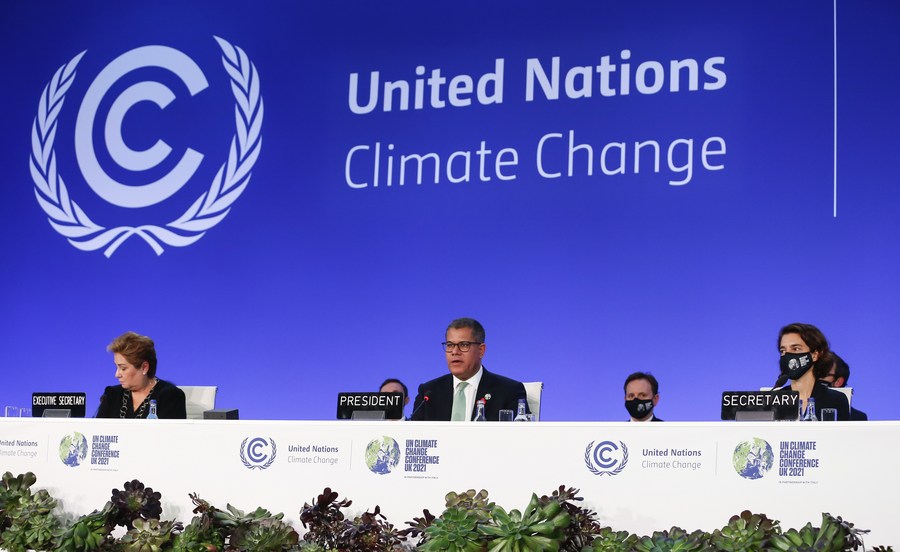
As extreme weather events hit more frequently and the specter of a disastrous temperature rise looms, the just-concluded United Nations climate change conference has brought the world renewed hope.
Nearly 200 participating countries adopted the Glasgow Climate Pact at the end of 26th session of the Conference of the Parties (COP26) to the United Nations Framework Convention on Climate Change, which concluded Saturday after a one-day extension.
Meanwhile, developed countries, whose industrialization is responsible for most of today's climate change impacts, were urged to pay their fair share.

Photo taken on Nov. 13, 2021 shows the closing plenary of the UN climate change conference in Glasgow, the United Kingdom. (Xinhua/Han Yan)
CONSENSUS ON CLIMATE ACTION
COP26 was held at a time when the world has gone through a rapid-fire onslaught of climate change-related weather disasters, from severe flooding to wildfires.
"The climate emergency is a race we are losing, but it is a race we can win," said UN Secretary-General Antonio Guterres.
After six years of discussions, COP26 completed the technical negotiations on the so-called "Paris Rulebook," which fixes the transparency and reporting requirements for all countries to track progress of their emission reduction targets.
The rulebook also includes the Article 6, which establishes a robust framework for countries to exchange carbon credits and is expected to facilitate emissions reduction.
"COP26 resulted in the completion of the Paris Agreement rulebook and kept the Paris targets alive," the European Union said in a statement.
The Glasgow Climate Pact "will help kick-start a new journey of global efforts to tackle climate change," Zhao Yingmin, head of the Chinese delegation to COP26, told Xinhua.
"The new global deal, especially the finalization of the rulebook of the Paris Agreement, bears great significance for defending multilateralism and the implementation of the Paris Agreement," said Zhao, who is China's vice minister of ecology and environment.
Negotiators at COP26 also agreed to phase down coal, the dominant source of carbon dioxide emissions in electricity generation. It is the first explicit mention of fossil fuels in a COP agreement.
During COP26, more than 100 countries have promised to end deforestation by 2030.
In the final days of the conference, China and the United States issued a joint declaration on enhancing actions on climate change in the 2020s, which has been widely welcomed and could galvanize global collective action.
The two countries agreed to establish a working group on enhancing climate action within this decade.
DEVELOPED COUNTRIES' CLIMATE DEBT
Developed countries in 2009 pledged 100 billion U.S. dollars a year to help lower-income nations by 2020. However, they still have not lived up to their promises. Recent reports indicate that this goal could be pushed back to 2023.
In the new climate deal hammered out by COP26, there are commitments to significantly increasing financial support through the Adaptation Fund, with developed countries urged to double their support to developing countries by 2025.
"There is some progress. However, it still falls short of expectations. There remain lots of regrets. The developed nations have failed to well address the core concerns of developing countries over such issues as adaptation, finance and technological support," Zhao said.
Guterres also urged developed countries to honor their climate finance commitment to restore political trust. "No more IOUs," he said.
"We've been coming to the COP meetings ever so often. What we have seen is the leaders are making such good speeches ... but we cannot see commitment," Charles Nyambura, from Pan African Climate Justice Alliance, told Xinhua at COP26.
"It is not about giving us money. It is about paying climate debt. We want to see our people supported to build their resilience to tackle climate change," he said.
It is "pretty disheartening" that the developed countries have failed to deliver their promises under the Paris Agreement, which has damaged the trust required for "a real partnership," Federica Bietta, managing director of the Coalition for Rainforest Nations, told Xinhua.
Instead of pointing the finger at others, Western countries should change their behavior, cut out fossil fuels and improve their energy efficiency, Carlos Martinez, a British author and political commentator, told Xinhua. "Furthermore, they should actually be providing finance and assistance to developing countries."

Aerial photo taken on Aug. 23, 2021 shows a view of the Saihanba forest farm in north China's Hebei Province. (Xinhua/Mu Yu)
CHINA WALKS THE TALK
China aims to have CO2 emissions peak before 2030 and achieve carbon neutrality before 2060. As a country known for walking the talk, China has translated its commitments into real action.
China's carbon intensity in 2020 was 48.4 percent less than that in 2005, which means that China had more than fulfilled its commitment of achieving a 40-45 percent reduction in carbon intensity from 2005 levels by 2020.
The drop in carbon intensity means a total reduction of about 5.8 billion tonnes of carbon dioxide emissions from 2005 to 2020, and demonstrates that China has largely reversed the rapid growth of its carbon dioxide emissions.
Xie Zhenhua, China's special envoy for climate change, explained that the measures countries around the world have been taking to cut emissions usually include improving energy efficiency, optimizing the energy mix, developing renewable energy, adjusting its industrial structure and developing forest carbon sequestration.
"China's contribution in these said areas accounts for about 30 percent to 50 percent of the world's total," Xie said.
According to the World Bank, China has accounted for more than half of the world's entire energy savings since 2005.
China has become the world's largest market for renewable energy, with renewable power accounting for 29.5 percent of overall electricity consumption, according to official statistics.
The country is also the world's biggest manufacturer of renewable energy equipment, ranking first in installed capacity of hydroelectric, wind and solar power generation, and has the largest nuclear power generating projects under construction.
"It's very clear China has been taking green sustainable development very seriously for many years, and has developed the concept of ecological civilization," said Martinez, the British commentator. "China's been putting significant resources into all of these projects."
Martinez said that China's targets on carbon peaking and neutrality are "very ambitious" and China "will continue to make remarkable progress towards the goals."
"China is a country which has taken probably the biggest U-turn in the world by shifting towards this concept of eco-civilization, which is based on low carbon development, which is based on nature-based recovery," Pakistan's Minister for Climate Change Malik Amin Aslam told Xinhua during COP26.
"What China is doing and the whole concept of eco-civilization is not talk," Aslam said. "It is action."